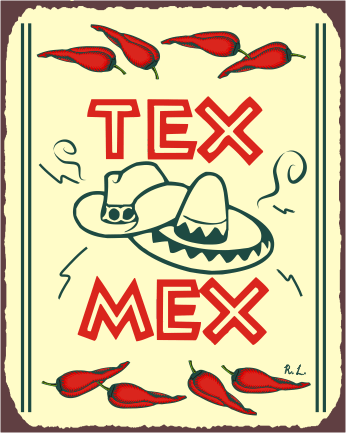 |
| Quien quiere teacher muncho Tex Mex ? |
Growing up in Laredo, I remember hearing and using the term "No tiene nada que haber" or "No tiene que haber nada". At leat that's what I thought I was hearing and saying. In effect, most people used it to me something like "It doesn't matter", or more accurately "It don't matter". For Example:
En Espanol : Person A-"Yo lo hiciera, pero no se como". Person B-"No tiene que haber nada, tratale como quiera"
In English: Person A-"I'd do it, but I don't know how". Person B-"It don't matter, try it anyhow".
Well, in the last few years, I've noticed that the saying "Nada que ver" has been gaining popularity. Although it sounds similar, I really don't know if it retains the same meaning. For one thing, "Nada que ver" literally translates verbatim into "Nothing to see". Yet, I've heard people using the phrase in the same types of situations where the older "No tiene nada que haber" would have been used.
Any linguist out there, correct me if I'm wrong. I take pride in our hybrid "Tex-Mex" language and want to make sure I keep up with such a dynamic regional dialect. I would defer to the on-staff linguists here at LaredoTejas, but they are currently in Madrid for a conference on "Castillian Spanish in Age of the Internet"
To comment or not to comment... ok, comment. I think "no tiene nada que haber" is probably something misunderstood because it doesn't make sense in Spanish.
ReplyDeleteI am not a Tex-Mex speaker, cuz, well, I didnt grow up in Texas - but one thing I do notice is that here, people tend to add an "ha" or "ah" sound to several words.
But I did grow up a Spanish speaker and "nada que ver" is a common idiom. It is short for an expression for "nothing to do with", not "nothing to see." For example, LaredoTejas no tiene nada que ver con frijoles fritos. But to shorten it, people say in response to someone who says LT is all about refried beans: "nada que ver." Clearer? If you don't believe me, I can ask my linguist friends to shoot you an email. Or maybe, just maybe, Texas has created a new phrase but... no lo creo. I think you were just hearing it a little differently.
Thanks for the clarification QF and Yes, I was hearing it a lot differently for many, many years. I guess what this means is that the proper version "nada que ver" just recently made its way into the everyday language of laredo. And also, yes I agree that "No tiene nada que haber" doesn't make sense but that's what I had been hearing since way back when. Thanks for your help, especially since our "linguists" are out in Madrid.
ReplyDeleteie: my comment for this article is "me gusta taco palenque" you answer will be "nada que ver" or "no tiene nada que ver" used frequently by younger people.
ReplyDeleteYes, it's the younger kids I've noticed saying this. I guess all those years, we were saying "haber" instead of ver. Well, Nada que ver con el blog.
ReplyDeleteIt's na' q ver hombre..where did you get the "haber" from??!
ReplyDeletesteph curry shoes
ReplyDeleteyeezy
birkin bag
golden goose sneakers
golden goose sneakers
jordan 13
lebron 18
kd 12
kyrie shoes
kyrie 7 shoes
z0x30f1f31 g2s63m0v04 t8c74p5l07 w0m38n0f85 m6d18a1n83 j8h93c3y33
ReplyDelete